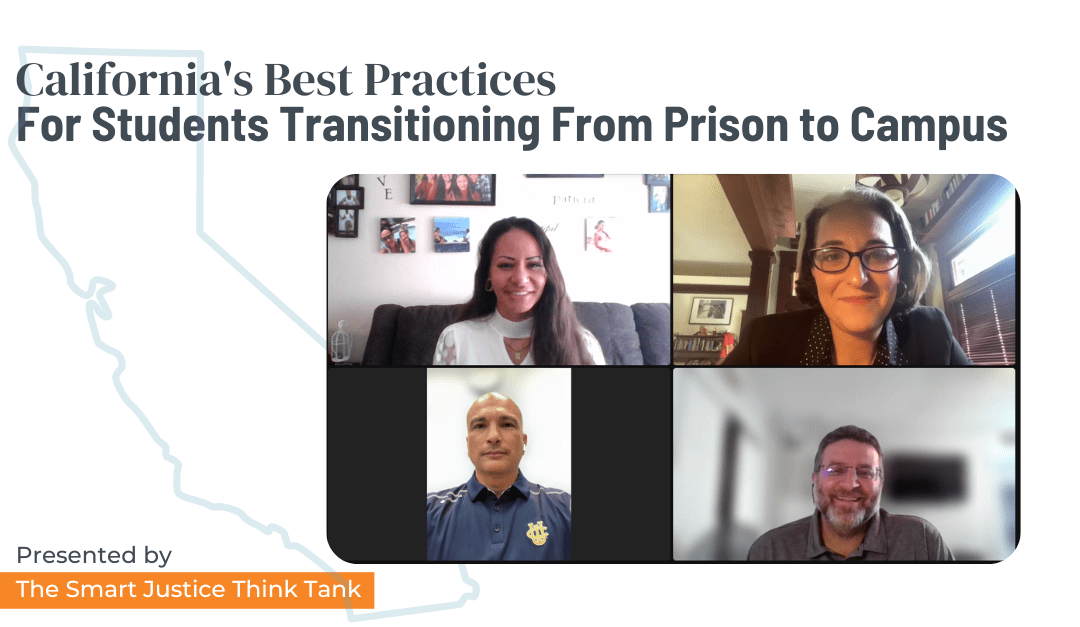By Kenia Miranda Verdugo
Attending college comes with many challenges for students: imposter syndrome, late nights, and endless study sessions to name a few. For formerly incarcerated students, the list is even greater as they face a unique set of challenges during their transition from in-prison higher educational programs to on-campus programs. The steps that postsecondary students take to pursue an education, such as obtaining the personal documentation needed to enroll and securing affordable housing, can quickly become barriers for justice-impacted individuals. Through the California’s Best Practices: Pathways From Prison to College Webinar Series, we intend to address these barriers and provide solutions informed by our Smart Justice Think Tank.
The third webinar of the series, which occurred on January 18, 2023, included a panel discussion with the following participants:
- Keramet Reiter, Professor and Vice Chair of Criminology, Law, and Society, University of California, Irvine (UCI)
- Nohealani Casperson, Scholar, California State University, Fullerton (CSU Fullerton)
- Patrick Acuña, Scholar, UCI
- Steven Green, Scholar, CSU Fullerton
The panelists shared the obstacles that they encountered while trying to obtain an education or continuing their education on the outside. Being on parole is a significant barrier that restricts where individuals must live and, therefore, where they’re able to attend school. Another challenge is technology. While an individual is incarcerated, they don’t have access to much technology, which results in a significant learning curve upon release into a world that expects mastery of email, Microsoft Word, and other commonly used programs. Additionally, many students struggle to meet their basic needs, such as housing, technology, and food insecurity while in college— struggles that are heightened if the students are formerly incarcerated.
Dr. Reiter shared her perspective of intangible barriers, “There’s this intangible challenge also of feeling like those layers of work to fill out that paperwork make people feel like they don’t belong, even our incarcerated students who we are so focused on trying to help succeed and create space,” she said. “One thing I’ve learned from them is just how important it is to do work to make them feel like they belong. And it’s something, particularly our formerly incarcerated staff have been wonderful with, showing students pictures of campus, bringing them campus material, having wellness workshops, and those things I just would have never thought to do.”
The feeling of exclusion is not hopeless, however. Dr. Reiter went on to share a recent highlight, “I heard students say at a site evaluation visit that they feel like UCI students first and prisoners second, and that’s got to be one of the best things I’ve ever heard. And I think that should be one of our goals: How do we make that identity feel like your first and primary identity in these spaces?”
We heard some of our panelists discuss initially feeling like they have a formerly incarcerated label on their forehead for the world to see. Education and best practices have helped them feel like they belong in these spaces, and we must continue the effort to expand this inclusivity.
In addition to discussing barriers, we also heard about attributes that formerly incarcerated students hold, which sets them apart from the rest. “I believe that…a lot of us [coming home from prison] are probably the best students on campus, even though we have many obstacles or barriers to overcome,“ Patrick reflected. “I know that I have these thoughts in my head that I don’t belong, or that somehow this is the real world and all the work that I’ve done in the past is somehow watered down or made easy. But for all the people that think that on the inside that is not true, what the professors…[are] giving you out here, you’re getting in there. So the work that you’re doing, and those grades that you’re achieving, and those high GPAs that you’re holding on to—that’s real, and you earn that.”
Not only do formerly incarcerated students deserve to belong on campus and are often excellent students, they also possess a drive unlike many others. “By virtue of surviving what we’ve gone through within the prison system we are highly resilient, or else we wouldn’t be alive. That’s just the truth. We would have checked out a long time ago, but we continue to push and we take that same drive and we bring it out here. There’s no limit to what we could do because we have it in us already and all we have to do is get out of our way,” Patrick championed.
The California’s Best Practices identified to support students as they transition from prison to college seek to provide a space where students can focus on their education without continuing to struggle to survive and belong.
To continue the conversation, join our next webinar in the series on March 29, where we will discuss Best Practices for Formerly Incarcerated Students Thriving on Campus.
To view the discussion in its entirety, a recording is below and a transcript is also available to download. For recordings of previous webinars from this series, visit our YouTube playlist.
Michelson 20MM is a private, nonprofit foundation seeking to accelerate progress towards a more just world through grantmaking, operating programs, and impact investing. Co-chaired and funded by Alya and Gary Michelson, Michelson 20MM is part of the Michelson Philanthropies network of foundations.
To sign up for our newsletter, click here.
